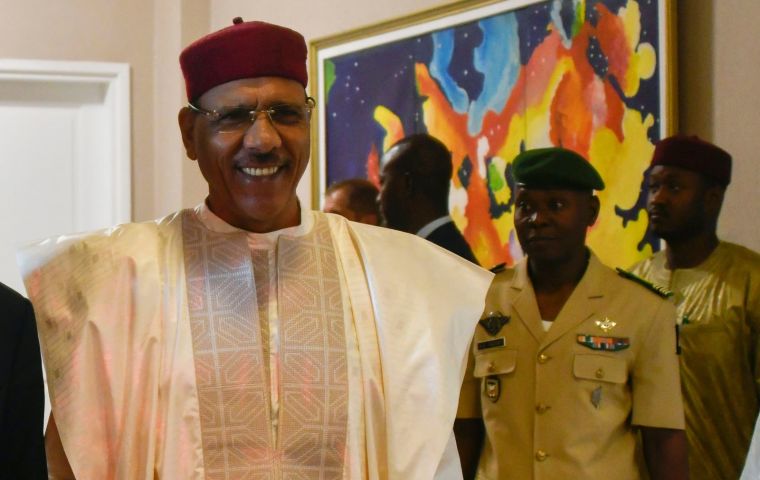MercoPress. South Atlantic News Agency
The Niger military coup, a new version of the Great Game?
 Ex president Mohamed Bazoum of Niger is now a prisoner in his own palace, overthrown by the head of the Presidential Guard, Gen. Abdourahamane Tchiani
Ex president Mohamed Bazoum of Niger is now a prisoner in his own palace, overthrown by the head of the Presidential Guard, Gen. Abdourahamane Tchiani By Gwynne Dyer
If you are a democratically elected leader in one of Africa’s Sahel countries — let’s say, Niger — and you suspect that the army is plotting to overthrow you, what’s the best countermeasure? Should you:
A) appoint all the army’s senior officers as ambassadors to distant countries (with lavish salaries), and replace them with more junior officers who will be loyal to you?
B) raise and arm your own party militia to protect you from the army?
C) hire the Wagner Group (Yevgeny Prigozhin) to keep your army in line?
Alas, there is no good answer. Shuffling the army’s officers around might buy you a year or so, but the new set of senior officers will soon develop the same ambitions to replace you that the old ones had.
Setting up your own party militia will be seen by the army (quite rightly) as an attempt to replace them, and will probably end up in a civil war.
Bringing in the Russians may be the best short-term solution, as the Wagner Group are much tougher than your own soldiers and can usually be paid in mineral rights. However, all Western aid will be cut off, and you can expect to have the French and U.S. intelligence services intriguing to overthrow you instead.
Soon-to-be-ex-President Mohamed Bazoum of Niger didn’t do any of these things, so he is now a prisoner in his own palace, overthrown by the head of the Presidential Guard, Gen. Abdourahamane Tchiani. (The latter now calls himself president, but most democratic countries in Africa still see Bazoum as Niger’s legitimate president.)
From the number of Russian flags that have appeared in the streets of Niamey, Niger’s capital, since the coup, it seems likely that Tchiani got in touch with the Wagner Group instead. It’s the Great Game again, this time with the Russians on one side and the Americans and the French on the other.
Most of Africa is not like this, and the African Union is really pushing back hard against this coup. It has given the coup plotters 15 days to “return to their barracks and restore constitutional authority.” If they refuse, the African Union will take “necessary action, including punitive measures against the perpetrators.”
What those might be remains to be seen, but why is it always the Sahel, the band of semi-desert land south of the Sahara running across Africa at its widest? In the first decades after independence in the 1960s, there were occasional military coups elsewhere in the continent, but in the past quarter-century they have been concentrated in the Sahel region.
It’s getting even more extreme. Of the 14 military coups and attempted coups in Africa in the past three years, 12 have been in what you might call the “Greater Sahel”: Niger two, Mali three, Gambia one, Guinea one, Burkina Faso two and Sudan three.
These countries have a lot in common. They are all Muslim, and all former French colonies except Sudan and Gambia. They are very poor even by African standards: All but one have per capita GDPs of less than $3,000 per year. And all except Gambia and Guinea are mostly desert, with the great bulk of the population living along one big river.
The great powers are always attracted by conflict in regions like this, because a small investment of money (aid or arms) or a small number of foreign troops seems to promise a large strategic or financial return.
The original “Great Game” was the 19th-century rivalry between the Russian and the British empires in the region of weak states and tribal territories between British-controlled India and Russian-ruled Central Asia. It was a complete waste of time and nobody won. In fact, there was nothing there worth fighting for.
The same applies to the mini-Great Game now underway in West Africa, and especially in the Sahel, between the Russians on one side and the French and Americans on the other. At the moment, it looks like the Russians are drawing ahead — but once again, it really doesn’t matter.
Go home, and let the African Union take care of it. If they can.




Top Comments
Disclaimer & comment rulesCommenting for this story is now closed.
If you have a Facebook account, become a fan and comment on our Facebook Page!